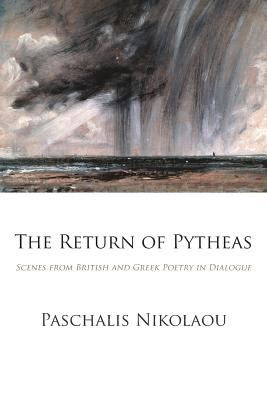
- We will send in 10–14 business days.
- Author: Paschalis Nikolaou
- Publisher: Shearsman Books
- ISBN-10: 1848615671
- ISBN-13: 9781848615670
- Format: 15.2 x 22.9 x 0.9 cm, softcover
- Language: English
- SAVE -10% with code: EXTRA
Reviews
Description
The Return of Pytheas is a study of poetry and poems through and across two language traditions - Greek and English. While the main focus is recent and contemporary, exchanges reach back as far as Aeschylus and the Iliad. The book thus investigates Christopher Logue's long and extraordinary engagement with Homer, as well as the more sporadic and varied influences of Greek landscape and culture since the 1960s on English poets such as Richard Berengarten, Sebastian Barker, Kelvin Corcoran and Peter Riley. The special history of Cavafy in Britain is also explored, starting with E. M. Forster, and continuing through the poetry of John Ash, Evan Jones and Don Paterson. As scenes from Ted Hughes's revisiting of ancient drama are echoed in Alice Oswald's recent writing, manifold continuations of translation and versioning are shown to be essential parts of poets' lives and work.
Across four chapters, populated with poems compelled by the sharing of reference and imagination, Paschalis Nikolaou delves into associations that are as constantly desired as they are auspiciously productive, including the endlessly varied conditions and factors that bring poets together. Nikolaou repeatedly locates intimate connections between literary cultures, as his analysis moves among extensive case studies, key meetings that emerge in and across time, and vistas threaded by poets as they pursue transfers of self, place, experience, and longing. The result is a close-range mapping of an entire community of poetic dialogues that are intensely lived as they are lived in, constantly revitalizing themselves as they carry into the 21st century.
EXTRA 10 % discount with code: EXTRA
The promotion ends in 19d.10:06:22
The discount code is valid when purchasing from 10 €. Discounts do not stack.
- Author: Paschalis Nikolaou
- Publisher: Shearsman Books
- ISBN-10: 1848615671
- ISBN-13: 9781848615670
- Format: 15.2 x 22.9 x 0.9 cm, softcover
- Language: English English
The Return of Pytheas is a study of poetry and poems through and across two language traditions - Greek and English. While the main focus is recent and contemporary, exchanges reach back as far as Aeschylus and the Iliad. The book thus investigates Christopher Logue's long and extraordinary engagement with Homer, as well as the more sporadic and varied influences of Greek landscape and culture since the 1960s on English poets such as Richard Berengarten, Sebastian Barker, Kelvin Corcoran and Peter Riley. The special history of Cavafy in Britain is also explored, starting with E. M. Forster, and continuing through the poetry of John Ash, Evan Jones and Don Paterson. As scenes from Ted Hughes's revisiting of ancient drama are echoed in Alice Oswald's recent writing, manifold continuations of translation and versioning are shown to be essential parts of poets' lives and work.
Across four chapters, populated with poems compelled by the sharing of reference and imagination, Paschalis Nikolaou delves into associations that are as constantly desired as they are auspiciously productive, including the endlessly varied conditions and factors that bring poets together. Nikolaou repeatedly locates intimate connections between literary cultures, as his analysis moves among extensive case studies, key meetings that emerge in and across time, and vistas threaded by poets as they pursue transfers of self, place, experience, and longing. The result is a close-range mapping of an entire community of poetic dialogues that are intensely lived as they are lived in, constantly revitalizing themselves as they carry into the 21st century.


Reviews